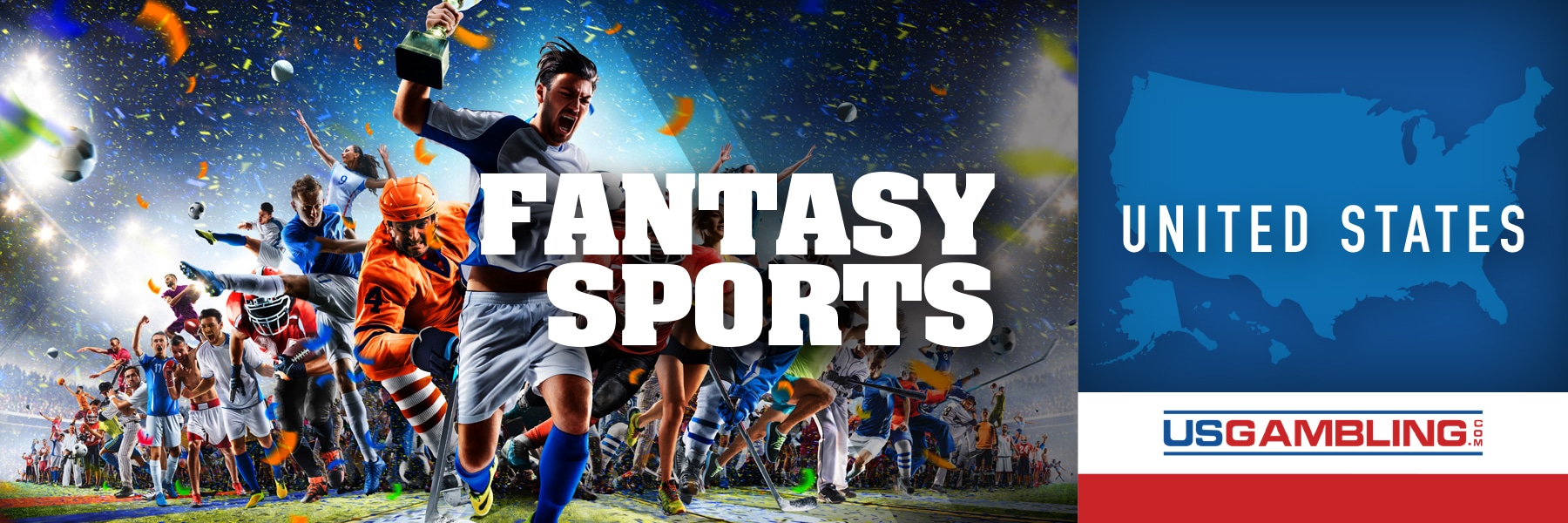US Daily Fantasy Sports
Daily fantasy sports (DFS) let you put your money where your mouth is and build your very own dream team for a chance to win real money every day. It’s almost like sports betting, except every play matters, and six or seven-figure payouts happen so often they don’t even make the news.
Plus, fantasy pick’em apps offer a twist on the traditional DFS format. Pick’em fantasy apps like PrizePicks and Boom Fantasy offer “higher or lower” contests that allow fans to predict whether athletes will exceed their projected stat totals.
One of the nice things about DFS apps and fantasy pick’em contests is they are legal in most states right now. If your state hasn’t legalized sports betting, you likely have options that serve as a close alternative.
Legal Daily Fantasy Sports Sites




21+ to Play. T&Cs Apply. Gambling Problem? Call 1-800-GAMBLER
Best Fantasy Sports Apps
The online fantasy sports landscape is no longer dominated by the DraftKings/FanDuel duo. Today, there are a multitude of DFS and pick’em fantasy apps, each with unique features and contest types, spanning simple over/under predictions for cash prizes, one-day fantasy contests, and season-long leagues for friends.
1. PrizePicks – Best DFS Site for Pick’em Sports
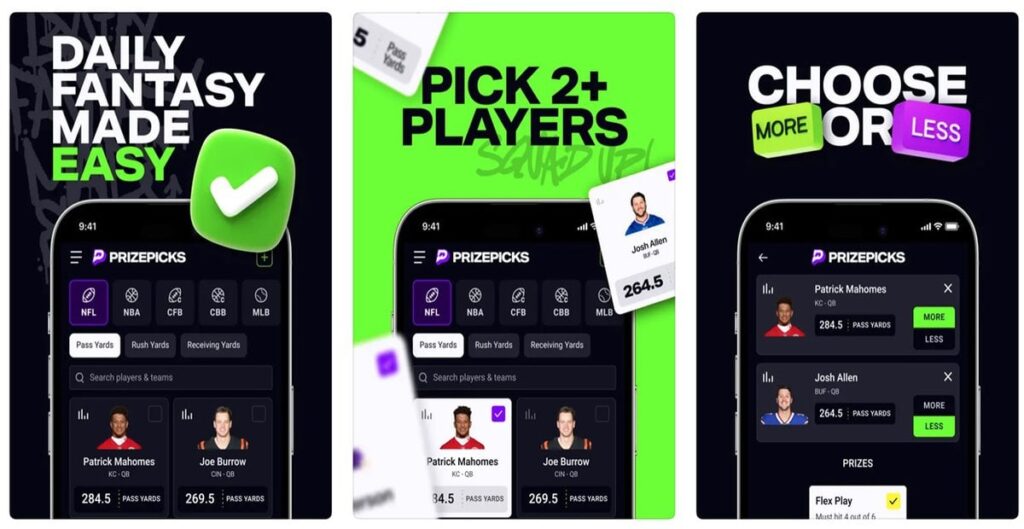
PrizePicks is the best fantasy sports app thanks to its established history, consistent updates, and unique contest types.
The PrizePicks app covers more sports and offers higher potential payouts (win up to 2,000x your money) than any other fantasy pick’em platform. Unlike some fantasy pick’em apps that boast large payout multiples, PrizePicks still offers generous payouts for lower-level lineups (full 3x payout for 2-pick lineups). Additionally, PrizePicks frequently introduces new features and offers continuous promotions for existing users.
All PrizePicks contests ask users to select 2-6 athletes, a statistical total each athlete (yards, points, etc.), and “more” or “less” for each athlete’s projected total in that stat. Power Play contests require every selection to be correct but offer the highest payout potential. Meanwhile, Flex Play contests offer secondary prizes for imperfect lineups but have lower maximum payouts.
Other features like Demons and Goblins add variety and depth to PrizePicks’ offerings. For example, the Demons symbol invite users to make a difficult pick (like “more” on an inflated stat projection) for an enhanced payout multiplier, while the Goblin symbol makes any projection easier (e.g., pick “more” on a depressed stat projection) at the cost of reduced payout potential.
PrizePicks’ sports coverage is by far the most extensive, even among the best fantasy sports apps. Fans can play pick’em contests for all the major professional leagues, college sports, esports, various international leagues, and a long list of niche sports (frisbee golf, jai alai, and competitive eating, to name a few).
Expert’s Comments: In my opinion, PrizePicks is the most user-friendly props DFS site. I’m particularly fond of its high-risk, high-reward Power Plays but like having the option of going the risk-averse route with Flex Plays.
2. ParlayPlay – Best DFS App for Free Fantasy Pick’em Contests

ParlayPlay is a standard fantasy pick’em app in some respects, but it stands out from the competition in others.
Most notably, ParlayPlay covers an above-average range of sports: NFL, MLB, NBA, NHL, UFL Football, college football/basketball, WNBA, MMA, golf, cricket, various soccer leagues, and numerous esports.
In addition, ParlayPlay offers a unique pick’em variant (described below), multiple free-to-play contests each week (some with integrated live chat and game highlights), pick’em insurance, boosted picks, slashed lines, and frequent promos for existing users.
ParlayPlay offers two contest types:
- More/Less Fantasy Parlays: Win up to 155x your money; 2-pick lineups pay 2.95x
- Hit It Contests: You pick two athletes, ParlayPlay provides several ranges for their projected stat totals, and you select a range for each athlete; 6x payout for getting both correct; 2x payout for getting one correct
- First and second-half pick’em games
Expert’s Comments: It is great to see DFS sites coming up with unique game types. I am hooked on Hit It games, they aren’t easy, but I have scored some 6x wins on NBA players. ParlayPlay is also the only mainstream fantasy pick’em app with a no-deposit bonus, so new users can try a contest of any type before depositing.
3. Underdog Fantasy – Best Pick’Em App
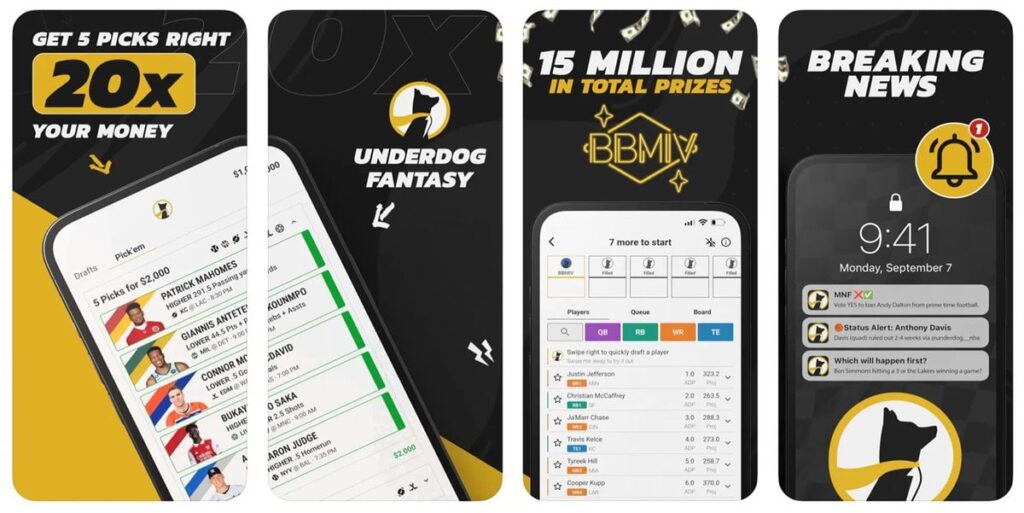
Underdog Fantasy is one of the best pick’em apps for several reasons:
- Higher/lower prediction contests with payouts of up to 500x; 2-pick lineups pay 3x
- Massive variety of covered sports, including all the major professional leagues (NFL, MLB, NBA, and NHL), college sports, the Olympics, esports, lacrosse, professional surfing, competitive chess, bare knuckle fighting, the annual hot dog eating contest, and more
- More stat projection categories than all other fantasy pick’em apps
- Best ball and daily draft leagues in addition to fantasy pick’em contests
- Regular odds boosts promos
Expert’s Comments – Underdog Pick’em games offer so much more variety than the average fantasy sports app. I regularly play NBA points and rebounds over/under games at Underdog. They let you predict a wide range of player stats, including hits, yards, and runs, and I am a big fan of their fast payouts. When I cash out via PayPal, I get my winnings within a few hours.
4. OwnersBox – Best for Unorthodox Lineup Contests
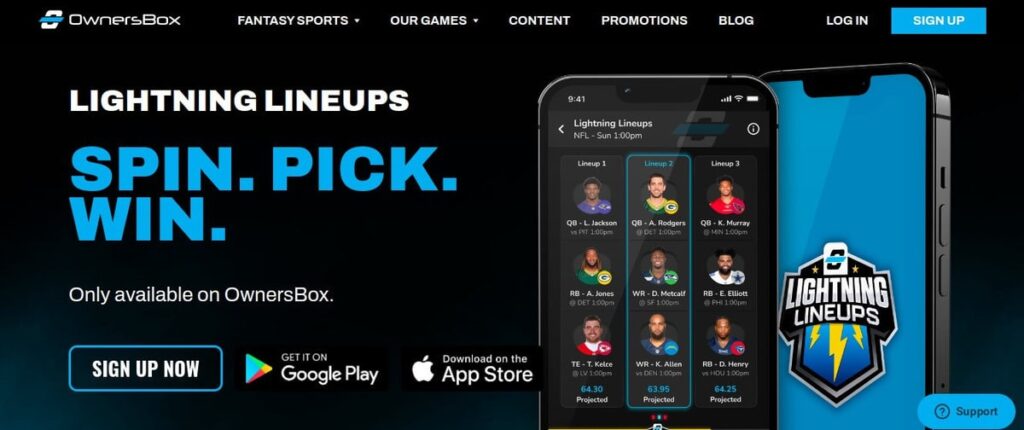
OwnersBox welcomes new customers with a 100% first deposit match up to $500. Unfortunately, the bonus does come with a 5x wagering requirement, while most daily fantasy bonuses come with wagering requirements of just 1x.
OwnersBox doesn’t have pick’em contests; instead, they have Superflex daily fantasy sports contests where you pick a lineup and battle against other players, but you get to add an additional player to your roster. They also have Lightning Lineups, where you spin until you find a lineup you like and then compete against OwnersBox’s fantasy team to see who accumulates the most points.
OwnersBox’s markets are definitely lacking compared to other DFS platforms, which include NBA, NHL, NFL, and MLB. In contrast, PrizePicks has tennis, MMA, boxing, soccer, and more. But OwnersBox does have season-long daily fantasy sports contests, which are increasingly rare today.
Additionally, OwnersBox is one of the few daily fantasy sports apps that has a loyalty program. Every time you play DFS contests, you accumulate OwnersBucks, the in-app currency, which then can be exchanged for cash which gives your winnings a boost. They also have free DFS contests with real money prizes.
5. Sleeper DFS – Best DFS Site for Fantasy Basketball Props
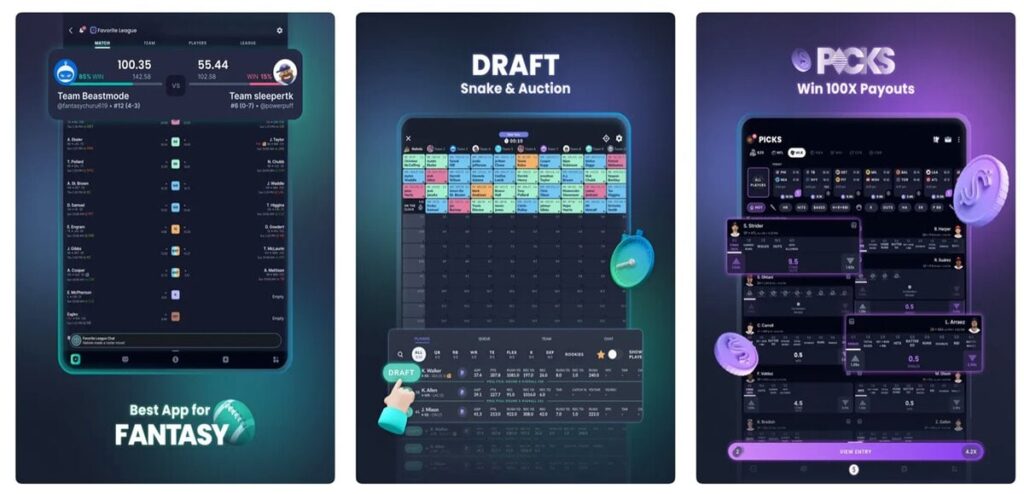
Sleeper is a San Francisco-based DFS site that launched in 2014. The Sleeper DFS app offers unique contest types, ranging from standard more/less predictions to Bracket Mania, where players create their March Madness brackets and compete for cash prizes. One noteworthy weak point is the limited number of sports leagues Sleeper covers.
Fans can earn payouts worth up to 100x, which is pretty good. However, unlike most fantasy pick’em apps, Sleeper doesn’t offer fixed odds for its pick’em DFS contests. Instead, payouts shift based on other customers’ picks. For example, if tons of users are predicting Lebron James will score under 25 points, then the payout will decrease.
Expert’s Comments: I enjoy the fun basketball props you can make on Sleeper. Their mobile site is well-designed, and playing is very easy. I wish they added a few more sports, and their tournaments don’t have the biggest prize pools, but if you are looking for basketball or football prop contests, Sleeper is a great option.
6. FanDuel DFS
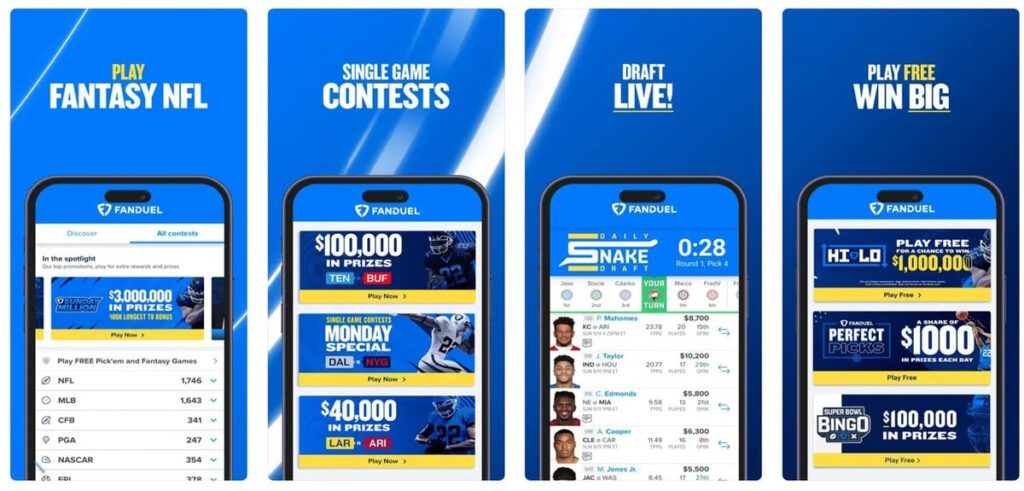
FanDuel launched all the way back in 2009 and is still going strong. They offer excellent customer support via live chat, a sleek mobile app for iOS/Android, and a good mix of contests, including Cash Games, GPPs, Qualifiers, and Head-to-Heads. FanDuel has a solid choice of sports, including NBA, NFL, MLB, NHL, golf, soccer, and more.
Expert’s Comments: You can catch me playing the Sunday Million every weekend! Where else can you find a DFS tournament with a $4 million guaranteed prize?
7. Vivid Picks App
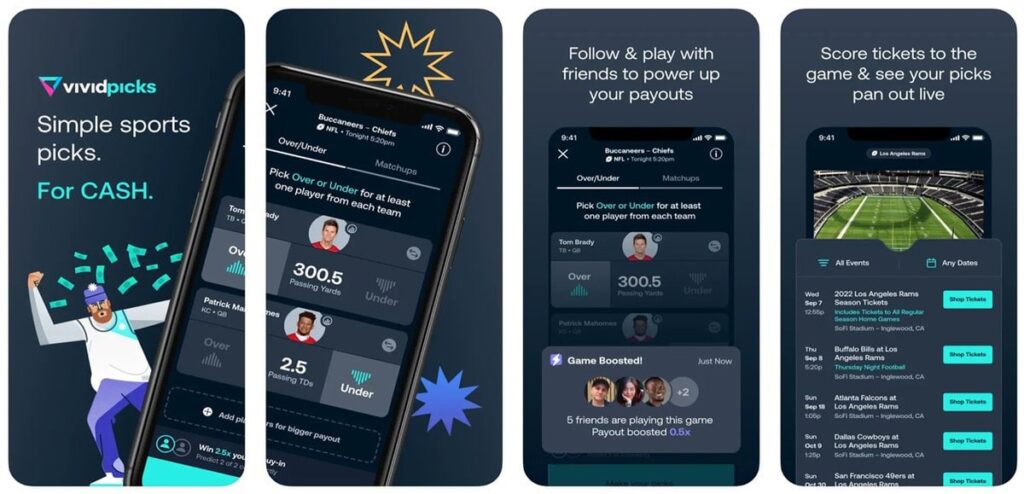
Vivid Picks offers standard more/less predictions and a “Versus” variant that involves picking which of two athletes will have the highest total in a specified stat category. The Vivid Picks app covers a wide variety of sports for prop games, including NFL, NBA, NCAA Football, NCAA, Basketball, MLB, NHL, PGA, CS:GO, League of Legends, NASCAR, and F1.
Its strong points include full 3x payouts for 2-pick lineups, unique Versus contests, power-ups to boost payouts up to 1,000x, regular leaderboard contests, and an integrated social element to follow and chat with other users.
Expert’s Comments: Vivid Picks has grown on me since they improved their payout structures and expanded their sports coverage. I’m glad, because I like the social media aspect and versus contests, and now I can justify playing here. There’s just one thing left to improve: give us live chat or customer support via phone.
Other DFS Apps We Like
What Makes A Quality Daily Fantasy Sports Site?
Choosing the wrong daily fantasy sports app can ruin your DFS experience and result in you playing boring games, earning minimal payouts, and potentially getting scammed. Look for DFS gambling sites that excel based on these factors:
- Bonuses – If a daily fantasy sports site isn’t offering you a big deposit match bonus, find another site. All of the best DFS apps, like FanDuel and DraftKings, have generous welcome bonuses.
- Sports Variety – While some DFS sites are stuck in the past and just offering fantasy football and maybe basketball, leading Daily Fantasy Sports platforms now offer various sports, including PGA, NHL, MLB, college basketball and football, e-sports, and MMA.
- Games – Budget fantasy sports sites offer classic fantasy tournaments, but not much else. In contrast, the best platforms offer exciting variants such as Best Ball, Pick’em, Showdowns, and more.
- User Interface – Playing your first DFS contest can be a little intimidating, trying to figure out who to draft and how to spend your salary cap has caused more than a few headaches. However, the best DFS sites have easy-to-navigate platforms and offer insightful guides to quickly help you assemble lineups and compete in real-money contests.
- Prize Pools – The most prominent daily fantasy sports sites offer the largest prize pools, while the best fantasy pick’em apps offer the biggest payout multipliers.
- Customer Support – If something goes wrong with a payment or there is a glitch in your game, you want to get the problem solved immediately. This is why professional and responsive customer support is so important. The best DFS sites offer 24/7 customer support via live chat, email, and even telephone.
- Fast Cash Outs – Who wants to hit a massive DFS win only then to be delayed for weeks and receive every excuse in the book from customer support? At the best daily fantasy sports sites, you can cash out on the same day via everyday payment methods like PayPal and electronic bank transfers.
- Commissions and Fees: Daily fantasy sports sites charge a commission for every game you play. You should always play DFS on the platforms that take the smallest cut, as these fees can really eat into your prize money, especially if you are a frequent player.
The Legality of Daily Fantasy Sports
Daily fantasy sports are legal under federal law, but states are given the final say in deciding if such games are legal within their borders. Currently, most states permit fantasy sports and have either passed legislation to license and regulate DFS sites or simply allow them to operate under existing consumer protection laws just like any other business.
Only a small handful of states do not allow fantasy sports to operate within their borders. Some of these states have legislation in place that clearly prohibits DFS while others are so unclear on the issue that most fantasy operators choose to stay out of those states.
States Where DFS Is Legal
In discussing the legality of DFS on a state-by-state level, we should note that the law does not always outright declare daily fantasy sites legal every state. In some states, the law is not 100% clear, but we consider them de facto “legal” states because the major fantasy sites have been operating there for years without any trouble from local officials.
In other words, you can play at the major fantasy sites from any of the following states:
| Alabama | Louisiana | Ohio |
| Alaska | Maine | Oklahoma |
| Arizona | Maryland | Oregon |
| Arkansas | Massachusetts | Pennsylvania |
| California | Michigan | Rhode Island |
| Colorado | Minnesota | South Carolina |
| Connecticut | Mississippi | South Dakota |
| Delaware | Missouri | Tennessee |
| Florida | Nebraska | Texas |
| Georgia | New Hampshire | Utah |
| Illinois | New Jersey | Vermont |
| Indiana | New Mexico | Virginia |
| Iowa | New York | West Virginia |
| Kansas | North Carolina | Wisconsin |
| Kentucky | North Dakota | Wyoming |
States Where DFS Is Not Permitted
The major daily fantasy sports apps do not accept customers from the following states:
| Hawaii | Montana | Washington |
| Idaho | Nevada |
How Federal Law Addresses Daily Fantasy Sports
The federal government mostly takes a hands-off approach to the regulation of fantasy sports by handing it off to the states. The one federal law that explicitly mentions fantasy sports is the Unlawful Internet Gambling Enforcement Act of 2006 (UIGEA) – and that law specifically exempts fantasy sports from anti-gambling provisions found within the law.
The UIGEA was originally passed in an effort to crack down on illegal online gambling, but its authors also included a number of exemptions to avoid disrupting forms of gaming that were already legal at the time.
Among those exemptions was one reserved just for fantasy sports contests. It reads as follows:
(ix) participation in any fantasy or simulation sports game or educational game or contest in which (if the game or contest involves a team or teams) no fantasy or simulation sports team is based on the current membership of an actual team that is a member of an amateur or professional sports organization (as those terms are defined in section 3701 of title 28) and that meets the following conditions:
(I) All prizes and awards offered to winning participants are established and made known to the participants in advance of the game or contest and their value is not determined by the number of participants or the amount of any fees paid by those participants.
(II) All winning outcomes reflect the relative knowledge and skill of the participants and are determined predominantly by accumulated statistical results of the performance of individuals (athletes in the case of sports events) in multiple real-world sporting or other events.
(III) No winning outcome is based–
(aa) on the score, point-spread, or any performance or performances of any single real-world team or any combination of such teams; or
(bb) solely on any single performance of an individual athlete in any single real-world sporting or other event.
To put that in plainer terms, the UIGEA states fantasy contests are legal as long as they meet these requirements:
- No full teams on your roster: Fantasy sites are not allowed to let players draft an entire team for their fantasy rosters. This rule seems intended to prevent fantasy contests from turning into de facto sports wagers.
- Prizes declared ahead of time: Prizes must be made known prior to fantasy contests going live. In other words, sites cannot hold contests in which the prize is determined by how many people buy in.
- Contests must cover multiple events: Per UIGEA regulations, every fantasy contest must cover more than one individual event to be lawful.
- Winning outcomes cannot be based on the score, point spread or single athletes’ performances: This stipulation also seems intended to maintain a clear line of distinction between fantasy contests and sports betting.
If you’ve followed the daily fantasy industry for any length of time, you may have noticed some contests that are being held these days seem to play fast and loose with some of the above rules.
For example, FanDuel and DraftKings have both held contests for the Super Bowl and regularly hold contests for single PGA tournaments. These contests seem to violate the provision that stipulates all contests must be based on the outcomes of “multiple real-world sporting or other events.” However, fantasy operators contend even individual games can be broken down into “multiple events” such as every play in the Super Bowl or every round in a golf tournament.
The validity of those arguments can be argued back and forth forever, but the only fact that matters is authorities in states with legal fantasy sites have chosen not to act. As long as the authorities decline to step in, these types of contests will go on.
DFS Partnerships with Sports Leagues
In 2014 and 2015, as DraftKings and FanDuel were establishing themselves as the leaders of an entirely new market, both sites went on a spree in forming partnerships with individual teams and entire leagues spanning the full range of pro sports in the US.
These partnerships were critical to each site’s early success and long-term prospects because not only did they provide name recognition, but they also formed the glue for powerful alliances down the line as lawmakers across the country began looking into the business model.
Back in those early days, the booming daily fantasy model had no precedent and lawmakers were unsure how to deal with the industry. Traditional fantasy sports leagues were already well known, but daily fantasy games played online was a whole new concept. With attorneys general in some states opining that DFS should be treated as gambling, the entire business model could very well have been snuffed out before it even had a chance to get off the ground.
By partnering with the powerful US sports leagues, the big DFS sites established a sense of legitimacy. If the NFL (which was openly hostile to sports betting at the time) was willing to partner with sites such as FanDuel and DraftKings, what could be the harm in letting those sites operate in the US?
These partnerships with the leagues as well as with the Fantasy Sports & Gaming Association (formerly the Fantasy Sports and Gaming Association) did much to establish daily fantasy as a serious business model.
The daily fantasy industry fell a little short of establishing its legality in all 50 states, but it came admirably close. Had the industry pioneers been lazy in this regard, daily fantasy easily could have been just another footnote in the history books.
Those existing relationships have also proven fruitful more recently with the legalization of sports betting. Now that FanDuel and DraftKings are both involved in the legal betting business, both have been able to build on the work done in those early days to extend their partnerships into sports betting.
DFS and Fantasy Pick’Em as an Alternative to Sports Betting
While much of the media coverage these days related to online online gambling focuses on the legalization of sports betting, something we like to stress here at USGambling.com is that daily fantasy sports and fantasy pick’em contests are an attractive alternative for fans who live in states that haven’t yet legalized online sports betting.
DFS Contests (One-Day Leagues) vs. Sports Betting
One of the big reasons daily fantasy caught on in the first place was its resemblance to actual sports betting. Although fantasy contests aren’t quite the same thing as traditional sports wagering, there are enough similarities that make DFS a worthy stand-in.
For one, your knowledge of sports is the key to success in both. If you’re intimately familiar with a certain sport or two, you’re already ahead of the game whether we’re talking sports betting or daily fantasy. Both are contests of skill and definitely reward those who make strategic decisions more often than those who wing it.
Secondly, fantasy sports grant greater significance to every play of every game just like sports betting. Games you wouldn’t normally watch suddenly become a whole lot more interesting when you have a fantasy lineup and real money on the line.
The legalization of sports betting seems to have generated more excitement than the legalization of DFS, but fantasy sports do have their strong points. One of those is the amount of money that can be won relative to your starting stake via DFS.
There are very few situations in traditional sports betting other than multi-leg parlays that offer large payouts relative to your original wager. Fantasy contests, by comparison, often issue six and sometimes even seven-figure payouts when enough people join a contest. Additionally, big contests tend to attract a lot of dead money – that is buyins made by people who really don’t have much of a strategy.
On the other hand, winning a big fantasy contest is quite difficult when you have sometimes a hundred thousand entrants who have all submitted their own lineups that will be competing against yours for the top payouts. However, major DFS sites do offer head-to-head contests which put you against a single opponent in a winner-take-all format that is much easier to win.
Fantasy Pick’em Compared to Online Sports Wagering
Fantasy pick’em contests are a step up from DFS leagues in their similarity to sports betting. Today, fantasy pick’em apps are the next closest legal alternative to online sportsbooks. Naturally, fantasy pick’em sites are the best option for fans in states without legal online sports betting.
A typical fantasy pick’em contest begins with picking at least two athletes slated to play in upcoming games. Next, the user selects one projected stat total for each athlete to pick “higher/more” or “lower/less.” Getting every prediction correct yields a payout. The more selections in the user’s lineup, the bigger the potential payout.
In short, fantasy pick’em contests are a lot like totals (over/under betting) combined with parlays.
The primary difference between sports betting and pick’em fantasy is that the latter comply with the UIGEA’s fantasy sports exception by requiring every lineup to include two or more athletes from at least two different teams.
The similarities are so striking that regulators in some states have ordered fantasy pick’em apps to either apply for sports betting licenses or cease operations. However, most states either explicitly permit fantasy pick’em apps or tolerate them.
How Daily Fantasy Sports Contests Work
Daily fantasy sports contests come in all different shapes and sizes these days, but we’ll start with an overview of the basic idea and then dive into some of the other variants that have come out over recent years.
In an online fantasy sports contest, you draft players from around the league and then watch the points roll in as your players score touchdowns, hit home runs and nail three-pointers in their real-world games. Score more points than the competition and you’ll finish the day with a bigger bankroll than you had that morning.
To sum up the basic idea, fantasy contests have you draft teams of players from around the league for a contest that will be covering a day’s worth of sports. The prototypical fantasy contest lasts exactly one day (hence the term daily fantasy sports), but it is not unusual to find contests that extend for longer time periods.
After you enter a contest and draft a team, you’ll start racking up fantasy points as your athletes perform in the real world. Every touchdown scored, strike thrown and pass completed by your athletes adds to your fantasy points total. After the conclusion of the last game on the slate, payouts are awarded to the entrants whose teams ended with the highest point totals.
Enter a Contest
The most basic type of online fantasy contest is the salary cap tournament. These contests always come with a guaranteed prize pool and are often referred to as “GPPs.”
Playing in a GPP begins with logging in to your favorite fantasy site, visiting the lobby and finding a tournament for your preferred sport. If you happen to be at one of the two biggest fantasy sites, you’ll have hundreds of contests to choose from at a wide range of buyins.
Draft a Lineup
Once you’ve paid the entry fee, you’ll be given a virtual salary to draft a team of players from around the league. Here, you’ll attempt to build the most effective team possible while also staying within your salary cap limitations.
This is where the strategic side of DFS shines because you only have so much money to spend on players, which in turn means you have to take great care in where you spend your money. For example, Patrick Mahomes might be an attractive pick for your quarterback position, but you’ll have to think twice before picking him if he costs $8,900 and your total salary for a 9-man roster is just $60,000.
In short, it comes down to figuring out where to spend big and where to save money. Spending big on one position will require sacrifices in other spots. Likewise, going for a cheap option in one position will free up money elsewhere.
Earning Points
Once you’ve drafted your team, the hard part is over and now it’s time to sit back and watch the points roll in. Every fantasy site has its own way of doing things, but generally the better your players perform on gameday, the more points you earn as a fantasy manager.
At the conclusion of the contest, players are ranked by the number of fantasy points their athletes earned throughout the day’s games. Standard GPPs use a prize structure similar to that of poker tournaments with the bulk of the prize money going to the top finishers and smaller payouts reserved for other high-ranking finishers.
Types of Fantasy Sports Contests
The contest described above is just one of many different types of contests offered today by various fantasy sites. In addition to standard GPPs, you’ll find heads-up contests, 50/50s, satellites, multipliers and more. Here’s a look at some of the most common types of DFS contests you will likely encounter during your time as a fantasy player.
Pick’Em: Pick’em contests are the daily fantasy equivalent of sports betting totals and parlays. How it works is the DFS site will post a player’s stats, and you need to predict whether their real in-game stats will be higher or lower. To comply with federal law, fantasy pick’em contests always require users to select at least two athletes from two different teams. For example, you might select LeBron James to score fewer than 27.5 points and Patrick Mahomes to throw more than 303.5 yards.
Rivals/Versus: A pick’em variant where two athletes are placed in a head-to-head scenario, and you need to select which player will outperform the other based on a particular stat. For example, Josh Allen and Joe Burrow may face off, and you need to select which player will throw for the most passing yards in their next game.
Guaranteed Prize Pool (GPP): The GPP is the most basic type of fantasy contest in which every entrant pays a buyin fee, is given a virtual salary to draft a lineup and then competes to earn the most fantasy points possible. Prizes are heavily weighted in favor of the top finishers, with some of the biggest contests paying as much as $1 million to first place.
50/50s: These are played similarly to GPPs but with a prize structure in which exactly half the entrants earn a payout of almost double their money. In a 100-person 50/50, for example, exactly 50 people would earn a payout.
What makes 50/50s attractive for some people is there’s no pressure to finish near the very top of the pack; all you need to do is outscore half the field to earn a payout. Whether you finish in 1st place or 50th in a 100-person double-up makes no difference because you’ll be paid the same regardless.
This format changes the optimal strategy as well. In a standard GPP, players tend to look for athletes with high ceilings due to the need to rack up an impressive point total to have a shot at the big money. 50/50s, by contrast, reward players who can identify consistent performers since all that’s needed is to finish within the top 50% of the field.
Payouts in 50/50s are almost double your money after accounting for the rake kept by the fantasy site to turn a profit. For example, a $10 double up will typically pay $18 to every person who finishes in the top half of the field. The other $2 is kept by the fantasy site as rake.
Double-Ups: Double-ups are very similar to 50/50s in that about half the field gets double their money. The difference is that a double-up actually pays exactly double your money, but slightly fewer than 50% of the field qualifies for a payout.
For example, a 23-person double-up with a $10 entry fee would pay exactly $20 to each of the top 10 finalists. The difference between 50/50s and double-ups essentially comes down to how the rake is collected. A 50/50 collects rake by paying slightly less than double your prize money; a double-up collects rake by paying slightly less than 50% of the field.
Head-to-Head: Head-to-head contests put you against just one other person for a winner-take-all prize pool. You miss out on the potentially life-changing payouts offered by GPPs but gain a much better chance of winning.
Head-to-head contests, 50/50s and double-ups are often referred to as “cash games” by the DFS community with the idea being that cash games are played for smaller, frequent wins (just like cash games in poker). By comparison, big GPPs are compared to poker tournaments with long stretches of coming up short punctuated by the occasional massive win.
Showdown: In showdown contests, you select 6 FLEX players from a single game, and you must include at least 1 player from both teams. For example, if the Philadelphia Eagles are playing the Kansas City Chiefs, you might select Patrick Mahomes, Jalen Hurts, D’Andre Swift, A. J. Brown, Isiah Pacheco, and Kadarius Toney. This is the only DFS game where you can draft 2 QBs.
Multipliers: These contests operate on a similar principle to double-ups but with a different “multiplier” for payouts. For example, you might find 3x multipliers that pay three times the buyin to the top third of the field, 5x multipliers that pay five times the buyin to the top fifth of the field or 10x multipliers that pay ten times the buyin to the top 10% of the field.
Satellites and Qualifiers: Satellites and qualifiers award entry into bigger contests in lieu of cash prizes. If a major tournament is coming up but the buyin is a little too hefty for your bankroll, you can usually find a satellite that will give you a chance to qualify for a fraction of the cost.
Some of the biggest championship events held every year for each sport can only be entered through qualifiers– buying in directly isn’t even an option. Thus, you’ll need to acquaint yourself with qualifiers at some point if you dream of competing in the world’s biggest daily fantasy contests with seven-figure prize pools.
The payout structure for satellites and qualifiers tends to be extremely top-heavy. That means only the first couple of finalists will win entry into the next event up while everyone else will go home with either a small consolation prize or nothing at all.
Steps: Steps are a series of contests with increasing buyins that build up to a final contest with big cash prizes. These contests are useful for bankroll building as you can start at the bottom with a low-buyin tournament and work your way up to a significant cash payout.
Steps can be organized in an endless number of varieties, but here’s a real example from DraftKings involving a 4-step series of contests:
- Step 1: $2 to enter, 10 players, 1st-2nd get a Step 2 ticket, 3rd-4th get a Step 1 ticket
- Step 2: $7 to enter, 10 players, 1st-2nd get a Step 3 ticket, 3rd-4th get a Step 2 ticket
- Step 3: $25 to enter, 10 players, 1st-2nd get a Step 4 ticket, 3rd-4th get a Step 3 ticket
- Step 4: $88 to enter, 6 players, 1st gets $200 and 3rd get a Step 4 ticket
Best Ball: Best Ball is a season-long league where you select players via a snake draft. Your cash winnings are based on your team’s performance over the entire season instead of individual games. You don’t have to manage your roster, you simply draft your lineup, and then each week, your top-scoring lineup is automatically assembled.
Friends Mode: The biggest fantasy sites offer a friends mode feature which allows you to create private contests and invite your friends. You can host them as regular daily fantasy contests or traditional season-long leagues with custom prizes and buyins.
Beginner Only: Beginner contests are highly recommended for all new players as they restrict entry to other players who are similarly inexperienced. DraftKings and FanDuel, for example, only allow players who have played in 50 or fewer contests to enter beginner contests.
Depositing at DFS Sites
You can read about daily fantasy all day long, but eventually there comes a time where the best thing to do is just jump right in, make a deposit and give it a try with real money on the line. Not only will this give you a chance to see what it’s like to have some skin in the game and decide if DFS is right for you, but the experience will also help you quickly figure out what works, what doesn’t and what you still need to research as a player.
With the best fantasy apps hosting contests for as little as a dollar, your first foray into DFS does not need to be a high-risk venture. Even playing for small stakes in beginner-only contests will give you a great sense of what it’s all about.
Minimum and maximum deposit and withdrawal amounts differ based on the payment method and DFS site. However, in a single transaction, you can deposit/withdraw anywhere from $1 up to $50,000 or more, so no matter your bankroll, you can easily move funds around.
Deposits are processed instantly, but withdrawals can range in processing time. PayPal and Venmo tend to be the fastest methods, and you will receive your winnings within 24 hours. Check and bank transfer are the slowest payment methods and can take 7 + days.
Let’s take a look at each of the most common deposit methods so you can find the one that best fits your needs.
Credit Cards: Credit card deposits are straightforward and funds are instantly credited to your account. If you’ve ever ordered anything online with a credit card, the process of funding your fantasy account is almost identical. You’ll need to pick an amount to deposit and then provide your card number, expiration date and CVV code.
The main thing to be aware of when using credit cards to play DFS is how much you’re spending. As much fun as DFS is, it’s not worth going into debt to play.
Debit Cards: An even better, more responsible alternative is to just use a debit card to play online. This deposit method is just as simple and fast as using a credit card, but doesn’t send you immediately into debt.
PayPal: PayPal offers more flexibility in terms of deposit methods and getting paid, which is nice for frequent DFS players. If you give daily fantasy a try and think you’ll be back for more, it’s worth considering signing up for a free PayPal account. Doing so will make it easier to track your bankroll and keep your DFS money separate from your other money.
You can fund your PayPal account via electronic bank transfer or something called PayPal CASH which allows actual cash deposits. If you choose PayPal CASH, you’ll be given a custom barcode that you can print out or save to your mobile device. Then, take the barcode to a nearby PayPal CASH location and pay with cash at the register to instantly load your PayPal account.
Once you have a funded PayPal account, you can then transfer the funds to your DFS account. PayPal adds an extra step to the process by acting as a middleman, but does come in handy due to its ability to receive payouts and to quickly move money from one DFS site to the next.
Withdrawing Your Winnings
Now we move to the best part of all: getting paid. If you do well in daily fantasy and acquire some winnings, congratulations. Few things feel as nice as cashing out a well-deserved win.
When the time comes to withdraw your winnings, most fantasy sites offer a few options. In some cases, your credit or debit card will simply be issued refunds for amounts up to the size of your original deposit. If your withdrawal is larger than that, the remainder will be given via PayPal or paper check in the mail.
PayPal is almost always the best option if at all possible because cashouts are processed quickly and you can then transfer the money straight to your bank account without even leaving the house. Checks via mail can take up to 7 business days, but will get the job done if you don’t have a PayPal account.

